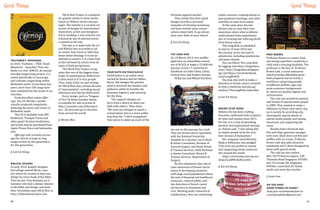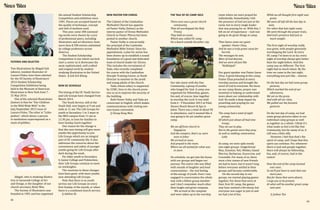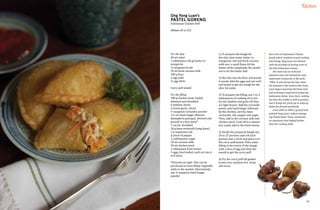This document contains the magazine of the Covenant Community Methodist Church. It includes articles on moving to new responsibilities in an interview with Pastor Khoo Kay Huat as he prepares to leave CCMC, a profile of Pastor David Wee who has recently joined CCMC, and a call for submissions for a new CCMC logo. It also contains regular features on getting to know members, recipes, Bible studies, songs and more.
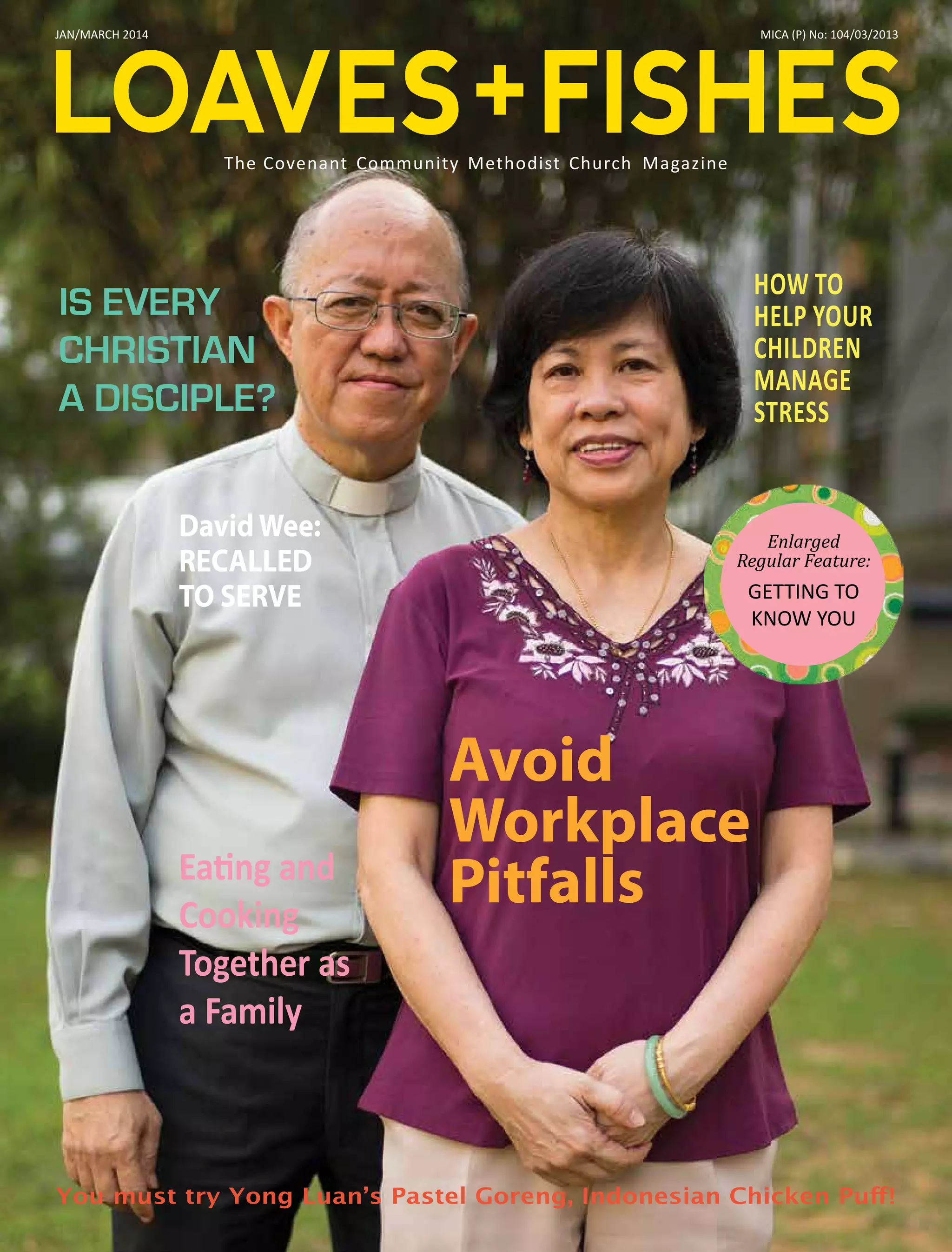

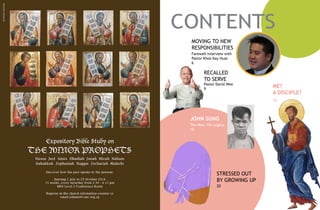
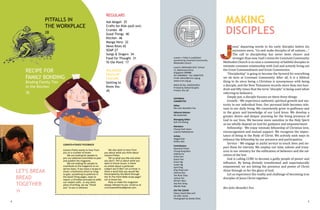
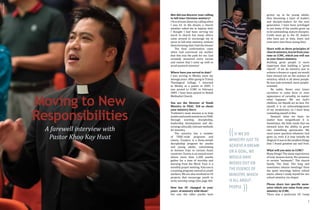
![8 9
where we created this activity
called the "Experience Museum",
patterned after the Holocaust
Museum in Israel. It presented
the various aspects of our lives
as disciples, such as service
through social concerns and
prayer. Although it wasn't done
as excellently as we had hoped, it
has become a spiritual milestone
for me, as it prepared me for some
really out-of-the-box ideas that I
am doing now with Truthmin.
During a warmth lunch, I was
pleasantly surprised and blessed
when church members had
specifically kept some food for the
different people involved in service,
who had to come down late for
lunch. That is what we call "family".
YouintroducedSOAPasamethod
of doing daily devotions to CCMC.
Has SOAP made a difference to
you personally?
I think reading the Word of God is a
fantastic thing, a heavenly privilege.
((TO BE ABLE TO
PROCESS AND HEAR
GOD SPEAKING
THROUGH HIS
WORD HAS BEEN
AN ENORMOUS
BLESSING TO ME.
))
So, to be able to process it and hear
God speaking through the Word has
been an enormous blessing to me.
In the 16+ months of doing SOAP, I
have had a lot of rock bottom valley
and mountain top experiences. The
Word has been a balm in the tough
times, guidance in the uncertain
times, and great affirmation in
joyous times.
What life lessons have you learnt
for yourself in the years you have
been at CCMC?
Besides the three principles men-
tioned before, there are these:
1) Relationship with God is more
important than ministry. Ministry
without relationship is a facade and
hypocrisy.
2) In a far deeper measure,
I learnt that God will provide
for every need, whether it is
encouragement, wisdom or even
finances.
3) The heart is deceitful above
everything else. I must constantly
scrub my heart.
What untapped potential do you
see in the people of CCMC?
I guess the same applies to the
universal Church: To achieve
maximum potential is to first
discover what God has put in us
in terms of callings and gifts. This
comes from walking with Him and
being able to hear His voice. After
that, it is a matter of obedience,
in following through with His
directions. And God will certainly
bring us to the fullness of life and
the future that He promises us.
What is your prayer for CCMC as
you prepare to move to a new
place of ministry?
That CCMC will be a Godly example
of what a covenant community
should be like.
How can we pray for you now?
Pray for wisdom and anointing in
life and ministry. [+]
HOW CAN I KEEP FROM SINGING*
Robert Lowry
My life flows on in endless song;
Above earth's lamentation
I hear the sweet though far-off hymn
That hails a new creation:
Through all the tumult and the strife
I hear the music ringing;
It finds an echo in my soul –
How can I keep from singing?
What though my joys and comforts die?
The Lord, my Saviour, liveth;
What though the darkness gather round!
Songs in the night He giveth:
No storm can shake my inmost calm
While to that refuge clinging;
Since Christ is Lord of heaven and earth,
How can I keep from singing?
I lift mine eyes; the cloud grows thin;
I see the blue above it;
And day by day this pathway smoothes
Since first I learned to love it:
The peace of Christ makes fresh my heart,
A fountain ever springing:
All things are mine since I am his –
How can I keep from singing?
How can I keep from singing?
* From Offerings: You are Worthy
(See page 40)
CASHLUNACCBY-NC-SA2.0](https://image.slidesharecdn.com/lfjan2014web-140604094228-phpapp02/85/Loaves-Fishes-Jan-Mar-2014-6-320.jpg)
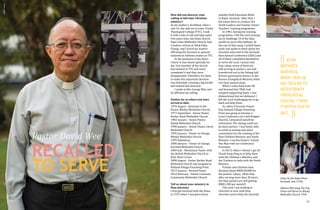
![12 13
Iban Annual Conference to raise
funds for their new church building
project in the new residential
township of Sibu Jaya. They started
with about 20 worshippers in a
shophouse and, today, there are
more than 120 people worshipping
there. They will raise 60% for this
building project and will need help
with the remaining 40%. The cost
is estimated at RM$1.2m. I am
excited about the potential of this
ministry. They need our help.
Has the Methodist church com-
munity changed over the years?
If so, how?
Change is a necessity as long as it
does not affect doctrines. In a way,
we are all changing all the time.
As we grow older each day, our
body changes, whether we realize
it or not. The same is true of the
Methodist Church in Singapore
from worship style to ministry
emphasis.
The TRAC Methodist Book
of Discipline has been so
transformed. Very creatively, the
Methodist Youth Fellowship has
been transformed into the Youth
Ministry, for example. We have a
danger of wanting to copy mega
churches and slowly lose our own
Methodist identity. Authority of
people in positions have been
diluted, from Bishop to President
to District Superintendents.
Structurally, when I first entered
the pastoral ministry, it was the
Bishop who appointed us pastors
to the churches. After that, it was
the President, and his District
Superintendents would execute his
directives. Pastors would provide
leadership in local churches. Today,
pastors are becoming like "office
CEOs".
These changes are not
fundamentally important as long
as the biblical contents remain
and are taught correctly in our
churches. These are structural
changes I am talking about.
Once, we were a Methodist
Church for the middle and lower
income. Today, we have become a
community of higher and middle
income, which would explain why
Methodist Welfare Services is
doing well, and a number of our
Methodist Churches have good
social outreach programmes.
We must never forget that Jesus'
ministry was to those with
needs – spiritual, emotionally,
psychological, mental, physical
and financial, especially the poor.
It is important to have a wholistic
ministry, one that is balanced.
Tell us three principals of church
ministry which you have learnt
from your time as a pastor.
My own outlook on ministry
has changed. I used to think of
myself as being a pastor of the
local church I am appointed to.
But after serving at Fairfield MC,
my understanding changed. I
now see myself as a pastor of the
community where the church is.
People are important, not
numbers. We can grow the church
but if the personal touch is missing,
the church is lukewarm or dead.
The clergy and the laity
must work hand in glove. When
professionalism gets into the
church life and ministry, then the
church has become an organization
and not the living Body of Christ.
Yet, at the same time, this does not
mean we do thing with an attitude
that condones sub-standards. In
the old hymn, "Give of your best to
the Master", the key word is "best".
I gave my best when I was working
in a secular job for five years
before entering the ministry and
I must continue to give even more
while serving the Lord.
I remember having some duties
at the Padang on Singapore's
National Day during my NS days.
To receive the President at 9
am, we had to turn up for duty
smartly attired at 6 am. That was a
privilege of duty.
So, where is God in our lives
on weekdays and Sunday as
pastors, Lay Ministry Staff and
church members? In the past, you
only have the pastor and the lay
leadership. Today, we have opened
the "Lay Ministry Staff" and "Lay
Executive or Professional Staff"
window. This can create a tension
over time because the Lay Ministry
Staff stay longer in the church than
the pastor and the pastoral role
can become blurred. So, this may
result in people asking "What do
the pastors actually do?"
What do you miss in your old
areas of ministry?
I miss being a pastor of a
small church – knowing every
member and ministering to them
individually. Today, most of our
churches have over 500 members
and even though it may have two
pastors, the struggle to relate, to
connect, to minister, is there.
Mission ministry to the Ibans
is where my heart beats most.
Every trip, including those that just
requires my presence to take facts
and photos for the records, give me
joy as I have the opportunity not
only to update information but to
relate and build bonds of Christ's
love and fellowship with our Iban
brothers and sisters.
I miss Barker Road Methodist
Church, my first pastorate. It has
a special place in my heart as I
remember learning and growing
together with the members, and I
appreciated the godly and loving
leaders there. Many held high
positions in life but I felt greatly
cared for and respected as they
supported me, a green horn, in the
pastoral ministry. I felt blessed.
Share two memories which you
value from your ministry.
There are simply too many
wonderful memories to pen. But
let me share these two:
I observed and learned with
great admiration the preaching
ministry of Rev Dr Tony Chi on my
first appointment to Wesley MC.
I am still an imperfect preacher
today, not because of him, but
because of my own limitations.
The second one was at Barker
Road MC. After Jessie delivered
our first born son, Jed, the ladies
came to visit and saw me washing
nappies and cooking in the kitchen.
They rallied around and got me
a washing machine and arranged
some ladies to cook and deliver
some food to us at least two to
three times a week. Jesus was
there for us through their kind
gestures and help.
What is the effect of daily devo-
tions in your life and ministry?
It is dynamic and uplifting. First,
the Word of God is so relevant in
all circumstances and situations in
life. Sometimes, you find words of
encouragement and, at other times,
assurance or even correction.
I have my own days of feeling
up as well as feeling down. Yet, God
speaks lovingly and gently. I used to
be an impatient youth and a fighter,
and I literally had fought bare fisted
with other youths. God's Word
changed that.
In the past, I memorized
scripture. But now that has
changed to knowing God through
His Word rather than just knowing
scripture.
What life lessons have you learnt
in your years of ministry?
God must come first before
anything else. Love people, not
things, including material wealth.
Rules and governance are there
to help us, not to bind us. It is a
privilege to serve, and so serve
with joy.
What are your prayers for CCMC
as you join the church as a new
place of ministry?
That we will build a good, healthy
relationship with MGS and make an
impact on the students, teachers,
staff, vice-principals and principal.
That we will fulfill God's
purpose in building a congregation
of disciples of and for Jesus Christ.
That God will use our different
giftings and strengths to unite and
make us shine for him in the Bukit
Timah community.
How can we pray for you?
For health. For wisdom in man-
aging time as I take on different
roles as pastor of CCMC, Director
of Seniors Ministry in TRAC, and
keeping an eye on Sarawak Iban
missions. To fit in quickly and be
a help to the pastors, the pastoral
team, the church leadership and
the membership. [+]
((PEOPLE ARE
IMPORTANT, NOT
NUMBERS. WE
CAN GROW THE
CHURCH BUT IF
THE PERSONAL
TOUCH IS MISSING,
THE CHURCH IS
LUKEWARM OR
DEAD. ))](https://image.slidesharecdn.com/lfjan2014web-140604094228-phpapp02/85/Loaves-Fishes-Jan-Mar-2014-8-320.jpg)
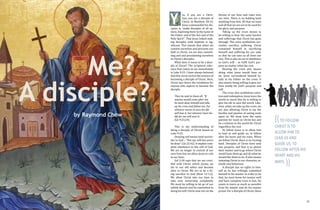
![16 17
is only one master and Lord and
that is Christ himself. Our loyalty
and devotion must be to him and
him only. Christ requires complete
allegiance and obedience.
The word “disciple” comes from
the word “discipline”. There can be
no discipleship if there is no disci-
pline. Following Christ is not just a
hollow or idealistic concept. It re-
quires concrete action on our part.
It requires daily discipline, disci-
plining our thought life, our behav-
iour, abiding in his Word, worship-
ping him in spirit and in truth, and
praying unceasingly.
Spiritual discipline has to be-
come a way of life. A disciple of
Christ reflects the likeness and glo-
ry of Christ. He upholds the prin-
ciples and values of Christ. He is
proud to be associated with Christ
and would only boast about his
master and not himself. He must
give all glory to his Master and
serve his Master with humility and
diligence.
CCMC has embarked on the vi-
sion of reminding every believer
that we are disciples and disciple
makers. It is the high calling that
Christ called us to.
What would a church be like if
there is no disciple? It would not be
a church at all! On the other hand,
if the church is filled with Christ's
true disciples, can we imaging how
powerful and dynamic the church
would be?
I believe we will see God’s pow-
er and presence manifested in our
midst in far greater measure when
we are a church committed to dis-
cipleship. There will be fruitfulness
and growth and the church will
glow and grow. I strongly believe
that being a disciple of Christ and
making disciples for Christ should
be the underlying heartbeat of all
we do. It is a vision that is clear,
concise and powerful!
I remember reading the clas-
sic book In His Steps by Charles M
Sheldon. In the story, the question
((FOLLOWING
CHRIST IS NOT
JUST A HOLLOW
OR IDEALISTIC
CONCEPT. IT
REQUIRES
CONCRETE ACTION
ON OUR PART.
))
"What would Jesus do?" and liv-
ing out the answer transformed a
whole church and impacted those
each member came into contact
with.
May we seek God's perfect will
and do what Jesus would have us
do. For a disciple of Christ is a fol-
lower of Christ: A Christian.
We need to ask ourselves a very
fundamental question: Are we con-
tented just to be a church goer or do
we live as disciples of Christ? This is
a important choice that no one can
make for us but only we can make
for ourselves.
I hope we will all make the right
choice and be committed to follow
it through by the empowerment of
the Holy Spirit. [+]
Raymond Chow is a lay ministry
staff at CCMC.
by GOH ECK KHENG
EVERY CHRISTIAN IS
A DISCIPLE
Matt 28:19-20
"Therefore go and make
disciples of all nations,
baptizing them in the name
of the Father and of the
Son and of the Holy Spirit
and teaching them to obey
everything I have com-
manded you. And surely I
am with you always, to the
very end of the age.”
for you. By this My Father
is glorified, that you bear
much fruit; so you will be
My disciples.
John 13:34-35
A new commandment I
give to you, that you love
one another: just as I have
loved you, you also are to
love one another. By this
all people will know that
you are my disciples, if you
have love for one another.
John 13:14-15
If I then, your Lord and
Master, have washed your
feet; ye also ought to wash
one another’s feet. For I
have given you an exam-
ple, that ye should do as I
have done to you.
I John 2:3
Now by this we
may be sure that we
know him, if we obey
his commandments.
1 Peter 1:15-16
but like the Holy One
who called you, be holy
yourselves also in all your
behavior; because it is
written, "You shall be holy,
for I am holy."
DISCIPES HAVE HELP
John 14:26
But the Helper, the Holy
Spirit, whom the Father will
send in My name, He will
teach you all things, and
bring to your remembrance
all that I said to you.
Disciple
To The Point
DISCIPES HAVE JOY
IN ABIDING
John 15:9-14
Just as the Father has loved
Me, I have also loved you;
abide in My love. If you keep
My commandments, you
will abide in My love; just as
I have kept My Father's com-
mandments and abide in
His love. These things I have
spoken to you so that My
joy may be in you, and that
your joy may be made full.
DISCIPLES SHARE CHRIST
Matt 28:19
Go therefore and make dis-
ciples of all nations, baptiz-
ing them in the name of the
Father and of the Son and of
the Holy Spirit…
17
HOW disciples LIVE
Matt 5:14a, 16b
“You are the light of the
world.... let your light shine
before others, so that they
may see your good works
and give glory to your
Father who is in heaven.
John 15:1-2, 5, 7-8
"I am the true vine, and
My Father is the vinedress-
er. Every branch in Me
that does not bear fruit
He takes away; and every
branch that bears fruit He
prunes, that it may bear
more fruit.... I am the vine,
you are the branches. He
who abides in Me, and I
in him, bears much fruit;
for without Me you can do
nothing.... If you abide in
Me, and My words abide in
you, you will ask what you
desire, and it shall be done
THE COST OF DISCIPLESHIP
Mark 8:34-35
When He had called the
people to Himself, with His
disciples also, He said to
them, “Whoever desires to
come after Me, let him deny
himself, and take up his cross,
and follow Me. For whoever
desires to save his life will lose
it, but whoever loses his life
for My sake and the gospel’s
will save it.
THE PURPOSE OF
DISCIPLES
1 Peter 2:21
For you have been called
for this purpose, since
Christ also suffered for you,
leaving you an example for
you to follow in His steps
John 8:12
When Jesus spoke again
to the people, he said, “I
am the light of the world.
Whoever follows me will
never walk in darkness, but
will have the light of life.”
TRUTH AND FREEDOM
FOR DISCIPLES
John 8:31-32
So Jesus was saying to
those Jews who had
believed Him, “If you
continue in My word, then
you are truly disciples of
Mine; and you will know
the truth, and the truth will
make you free.”](https://image.slidesharecdn.com/lfjan2014web-140604094228-phpapp02/85/Loaves-Fishes-Jan-Mar-2014-10-320.jpg)
![18 19
Many of us have heard of great
evangelists like Billy Graham and
Billy Sunday, but probably few
of us have heard of a man whose
relatively short fifteen-year minis-
try has and will impact China and
South East Asia for generations to
come – Doctor John Sung.
Doctor Sung was born as Sung
Shang Chieh in 1901 to a Christian
family. He was raised in Hinghwa,
Fukian, China. His ministry started
when, as a young boy, Sung would
go around every Sunday with his
father who was a pastor. When his
father was absent, Sung would step
into his shoes as the substitute
preacher, and this earned him the
nickname "little pastor".
One day, Sung felt a calling from
God to go to America for further
studies. At that time, this was
almost unheard of, especially since
Sung's father earned a mere 30
dollars a month. However, Sung felt
convicted to go and nothing stood
in his way. With herculean effort
and a lot of fundraising, Sung man-
aged to raise the dollars needed to
pay for a trip to America.
In America, Sung studied at
the Ohio Wesleyan University and
The Ohio State University. He was
a brilliant student and took just
seven and a half years to earn his
doctorate in Chemistry.
Despite all his intelligence and
qualifications, Sung had already
chosen the path he wanted to take.
Back in China, he rejected an offer
from Peking University which came
with a lucrative salary. He also
rejected a research fellowship in
Germany. While contemplating his
future, he had discerned God say-
ing to him, "What shall it profit a
man if he gain the whole world and
lose his own soul?" (Mark 8:36).
So, he gave himself to the preach-
ing of the Gospel.
For a large part of his evange-
listic work, Sung was a member of
an evangelistic group known as the
Bethel Band. This preaching band
consisted of Sung, Andrew Gih,
Philip Lee, Frank Ling and Lincoln
Nieh. They travelled all over China,
spreading the gospel. Sung and Gih
were the main preachers.
Known for his energetic preach-
ing style and dramatic delivery,
Sung’s fame spread like wildfire
across China. During gospel servic-
es, he encouraged the congregation
to confess and come right with
God. This firebrand’s charisma
was very amazing and hundreds of
people, believers and non-believ-
ers, would repent of their sins and
let Christ into their hearts at every
service.
On one occasion, at a confer-
ence where Sung preached, all the
provinces in China but one was
represented among the congrega-
tion. The numbers in the congrega-
tion were far more than
the location could hold. This was
a common occurrence at many
services when Sung preached.
As quoted so aptly from his
biography by Leslie T. Lyall, “Those
were hallowed days of blessing and
great joy. It was more than ever
clear that Dr Sung was an instru-
ment God has raised up for such a
time in history of the nation and of
the Church in China.”
During his preaching days, Sung
visited Singapore a total of seven
times. Thus, his messages did have
a huge impact on our very own
country as well.
Yet, despite all his achieve-
ments, Sung was far from a perfect
man. One of his shortcomings was
his lack of social graces, and he
was known to be rather curt and
unsociable. Furthermore, he often
spent long periods of time away
from his family and left his wife to
handle family affairs. Unfortunate-
ly, sacrifices had to be made for
Sung’s amazing work.
Once, Sung was sent to a mental
asylum for 193 days by seminary
authorties because his passion-
ate preaching caused them to
think that he was out of his mind.
During that time, he read the Bible
40 times from cover to cover! He
became grounded deeply in God’s
Word. This was a turning point in
Sung’s life as he fully committed
himself to God’s work, and he real-
ised that God had given him those
193 days to rediscover himself and
to have a spiritual walk with Him.
In fact, this period sets the stage
for what was to be one of the great-
est revivals ever witnessed in Asia.
Sung died at the age of 42 from
intestinal tuberculosis. Till his very
last day, he continued to praise
God and relied on him for strength.
Even in his dying days, he contin-
ued to preach, speaking in sitting
or lying position because of his
great discomfort. Though his body
was weak, the fire in his eyes
continued to burn with that same
passion for God that everyone
had become accustomed to. As a
Chinese saying goes," Life is like a
candle. Its quality isn't measured
by its length, but by the amount of
light it shines onto others."
Doctor John Sung was a man
who leaves behind a great legacy,
and the impact of his ministry will
be felt for generations to come. He
was an inspiration to all who met
him. John Sung is someone I would
truly call a bright candle. [+]
Kevin Tong worships in OC at CCMC.
(( Sung visited Singapore a total of
seven times. Thus, his messages did
have a huge impact on our country.
))
JOHN SUNG
The Man, His Legacy
KEVIN TONG](https://image.slidesharecdn.com/lfjan2014web-140604094228-phpapp02/85/Loaves-Fishes-Jan-Mar-2014-11-320.jpg)
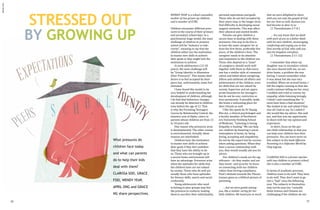
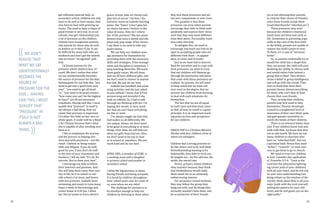
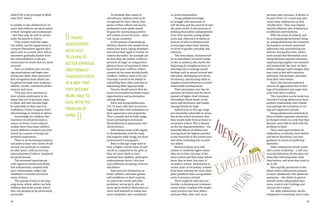
![26 27
Here are some tips to parents of early and young adolescents
to promote the teenager’s social and emotional success.*
• Support and praise your child’s efforts and accomplishments.
• Listen and openly talk with your child.
• Recognise that your teenager’s feelings are real and be careful
not to minimise or dismiss them.
• Understand your teenager’s need to be like his peers.
• Tolerate (within reason) your teenager’s developing likes
and dislikes in clothes, hairstyles, music.
• Encourage your teenager’s goals, plans for the future.
• Spend time together as a family.
• Educate your teenager about risks associated with alcohol
and drug use.
• Talk with your teenager about the physical changes in
puberty that affect height, weight, and body shape. Avoid
critical statements or nagging about eating, weight or
appearance.
• Be involved in your teenager’s school life and attend events
and parent-teacher conferences.
* Source: Developed by the Life Education Committee of
Kankakee and Iroquois counties with funding from the U.S.
Department of Education’s Grant to Integrate Schools and
Mental Health Systems.
SOCIAL & EMOTIONAL
SUCCESS FOR TEENS
in a constructive way, where there
should be a balance between the
adolescents’ needs to assert their
individuality and the need to re-
main close and connected to their
parents. The process of exploring
autonomy therefore allows adoles-
cents to identify their own choices,
instead of over relying on those
imposed by authority figures.
In late adolescence, individuals
become increasingly aware of the
social norms related to sex and
sexuality – the extent to which ad-
olescents perceive that their peers
are having sex, using protection,
sexual permissiveness, and so on.
This might pose a great problem
as this age range is a period where
adolescents’ susceptibility to peer
pressure is at its peak.
As adolescents start participat-
ing in romantic relationships more
seriously, they draw from their
previous social experiences with
family and friends. In late adoles-
cence, they become increasingly
vulnerable to emotional volatility
– they more frequently report feel-
ings of loneliness, embarrassment
and anxiety, together with extreme
mood swings.
While emotional volatility
might have stemmed from hor-
monal changes that occur during
puberty in early adolescence, emo-
tional volatility in late adolescence
might have more basis in the is-
sues related to independence and
environmental factors where new
anxieties and pressures like fitting
in, achieving good grades and peer
conflicts which are intensified dur-
ing adolescence may contribute to
a high level of stress.
As adolescents move towards
adulthood, they gradually begin to
work toward their own goals. They
want to be respected as young
adults and sometimes will resist
a controlling adult. Most impor-
tantly, they need an environment
that stresses honesty, fairness and
responsibility. [+]
ADELINE EE
Jesus, Our Rest
S: Matthew 11:28-30
Come to me, all you who are weary
and burdened, and I will give you
rest. Take my yoke upon you and
learn from me, for I am gentle and
humble in heart, and you will find
rest for your souls. For my yoke is
easy and my burden is light.
O: Jesus calls all who are weary
and burdened to come to him,
be like him, and learn from him.
A: Jesus was very active in preach-
ing, teaching, healing the sick, and
dealing wisely with cunning Phar-
isees. Yet, in doing all these things,
he was always very restful, never
LEE YIN SIAU
His Easy Yoke
Matthew 11:29
Take my yoke upon you and learn
from me, for I am gentle and hum-
ble in heart, and you will find rest
for your souls.
O. Jesus wants us to surrender our
burdens to him and to rely on him,
taking on his yoke instead of strug-
gling on our own. When we learn
BO CHAI HIAH
Guard Our Hearts
S: Matt 15:18
But the things that come out of the
mouth come from the heart, and
these makes a man “unclean”.
O: The heart is where we have
our beliefs, attitudes, convictions,
emotions and will. God looks at our
heart. In the Sermon on the Mount,
the root of murder is anger, and
that of adultery is lust. The secret
places of our hearts determine our
words and deeds.
A: We must guard our hearts for
it is the wellspring of life. As our
heart is deceitful above all else, we
need God’s word and Spirit to lead
us. As a parent, I need to address
the heart issues of my child and
not get overly concerned with
external behavior.
P: Lord, we commit our hearts to
you. Let it not be hardened due to
disobedience. Give us a heart in
tune with you. Amen!
SOAP
Many from CCMC have found
that using the Life Journal
Reading Plan, also known as the
SOAP method of daily devotions,
has drawn them closer to God
as they read scripture expecting
God to speak.
Postcards with the scriptures
for SOAP readings are regu-
larly distributed in CCMC. You
can also access the Life Journal
Reading Plan by downloading
the You Bible app on your phone.
Here, we share how the same
passage spoke differently to
three people.
TAN BUCK CHYE
Come to Jesus
S: Matthew 11:28
Come to me, all you who are weary
and burdened, and I will give you
rest.
O: Jesus was probably referring to
the heavy spiritual burdens and
yoke of Old Testament laws laid on
by the Pharisees.
A: 'Come to Jesus' is to believe and
trust him. Powered by His Holy
Spirit, we will be carried in the
arms of Jesus rather than laboring
by the efforts of our fallen self.
P: Each time I am down, I look to
you Lord, and know that I am loved
by you. Nothing else matters. I will
be still and know you are God.
worried, stressed or desperate.
Jesus, who is restful yet effective,
lives in us too. We can look to him
let him lead and guide us, we can
flow with him in a restful peace, to
be effective and fruitful wherever
we are.
P: Dear Lord, help us to draw our-
selves out from this world, to place
our hearts in seeking rest in you. In
Jesus' name, Amen.
and submit to his way, by his grace,
we will find peace and rest.
A. God never guarantees that
believers will have a stress-free
life. But he promises that we can
exchange our yoke for his, that we
will always have help. Whatever
yoke we are carrying, even if we
like to imagine that our yoke is the
heaviest, we are never alone when
we surrender and let him takeover.
P. Thank you Lord for Your grace
which is more than sufficient for
each and everyone of us. You will-
ingly bear our burdens when we
ask, though we often wallow and
complain. Help us, in all humility,
to focus on your mighty strength
and your glory, and give thanks for
your easy yoke!](https://image.slidesharecdn.com/lfjan2014web-140604094228-phpapp02/85/Loaves-Fishes-Jan-Mar-2014-15-320.jpg)

![30 31
less the Lord watches over the city,
the watchmen stand guard in vain.
In vain you rise early and stay up
late, toiling for food to eat – for he
grants sleep to those he loves.
(Ps 127:1-2)
independent spirit
Established business principles.
Experience. What was taught in
professional courses. Advice and
consultation. These are some of the
things that help us make decisions
in the course of everyday work.
It is all too easy to make pre-
sumptions, assuming, even believ-
ing, that we are doing God's will
when we have never waited or
listened to his instructions.
As much as God has given us
brains and the ability to acquire
and use knowledge, how wonder-
ful it is that we can still rely on him
for guidance and direction.
Trust in the Lord with all your
heart and lean not on your own
understanding; in all your ways
submit to him, and he will make
your paths straight. Do not be wise
in your own eyes; fear the Lord and
turn away from evil. It will be heal-
ing to your body and refreshment to
your bones.… (Proverbs 3: 5-8)
But they soon forgot what he
had done and did not wait for his
counsel. In the desert they gave in
to their craving; in the wasteland
they put God to the test. So he gave
them what they asked for, but sent
a wasting disease upon them. (Ps
106:13-15)
building our barns
at the expense of god's house
This point comes from the book of
Haggai. The Jews had been allowed
by the king of Persia to return to
Jerusalem to rebuild God's temple.
Work was started but the Samar-
itans caused all the work to come
to a halt. Sixteen years went by and
the people became more interested
in working on their houses than
rebuilding the temple of God.
The prophet Haggai then
encouraged God's people to finish
rebuilding the temple, saying that
the problems the Jews were facing
was due to their laziness in the
things of God.
We must be careful that we
do not become so engrossed in
building our own kingdoms at the
expense of building the Kingdom
of God.
This is what the Lord Almighty
says: "Give careful thought to your
ways. Go up into the mountains and
bring down timber and build the
house, so that I may take pleas-
ure in it and be honored," says the
Lord. "You expected much, but see,
it turned out to be little. What you
brought home, I blew away. Why?"
declares the Lord Almighty. "Be-
cause of my house, which remains a
ruin, while each of you is busy with
his own house. Therefore, because
of you the heavens have withheld
their dew and the earth its crops.
I called for a drought on the fields
and the mountains, on the grain,
the new wine, the oil and whatever
the ground produces, on men and
cattle, and on the labor of your
hands. (Hag 1:7-11) [+]
((AS MUCH AS
GOD HAS GIVEN
US BRAINS AND
THE ABILITY TO
ACQUIRE AND USE
KNOWLEDGE, HOW
WONDERFUL IT IS
THAT WE CAN STILL
RELY ON HIM FOR
GUIDANCE AND
DIRECTION.
))
+From time to time, I will ponder
about life and the various ways we
can get stuck in discouragement or
despair. That is not necessary. All
it takes is a change in perspective.
In God's time and wisdom, we all
can learn to re-direct our energies
toward constructive thinking and
helpful living. Here are 14 thoughts
which can help us change our
perspectives.
1) It doesn't matter if the
plans you have made have failed
miserably; it matters more that
you have given your best and have
succeeded in trying.
2) It doesn't matter if your
superiors constantly complain or
criticize your work; it matters more if
you can distinguish the constructive
from the destructive, and respond
humbly.
3) It doesn't matter if you've only
got a C in your mid-terms; it matters
more if you become more resilient
to try again, and aim for an A in life.
4) It doesn't matter if all the
world's a stage and everyone seems
to be mere players; it matters more
if the world stage is your chance to
be the best player you can be.
5) It doesn't matter if you do
not know what to do with your life;
it matters more if you do not stop
seeking and searching for your calling.
6) It doesn't matter if people
brand you a failure in things you
do; it matters more if you see each
failure as a step toward success
waiting to happen.
7) It doesn't matter if you feel
inadequate every time you go to
Bible study; it matters more if each
time you go, you learn that only in
God, one is adequate.
8) It doesn't matter if you feel
your life in the past had been
wasted; it matters more if you
recognize that there are still many
years left to try living well again.
9) It doesn't matter if you
cannot remember all the Ten
Commandments; it matters more if
you put into practice what you CAN
remember.
10) It doesn't matter if you
feel your spiritual life is stagnant;
it matters more if you not only
recognize it, but is prepared to do
something about it. You can start
with praying first.
11) It doesn't matter if you feel
lonely, or think no one seems to be
listening to you; it matters more
if you know that God listens even
when the world turns away. Jesus
knows what loneliness is all about.
12) It doesn't matter if you have
not brought anyone to Christ in the
past; it matters more if you learn to
shine wherever you are, that you
are part of the sowing, watering, or
cultivating. Let someone else do the
harvesting while you do the planting.
13) It doesn't matter if you feel no
one appreciates you, or thanks you
enough; it matters more if you appre-
ciate others and thank God more.
14) It doesn't matter what you
think about yourself; it matters more
what God thinks about you.
Food forThought
BY YAP KIAN SENG
Fruit is always the miracu-
lous, the created; it is never
the result of willing, but
always a growth. The fruit of
the Spirit is a gift of God, and
only He can produce it. They
who bear it know as little
about it as the tree knows of
its fruit. They know only the
power of Him on whom their
life depends.
~ Dietrich Bonhoeffer,
The Cost of Discipleship
Action and contemplation
are very close companions;
they live together in one
house on equal terms. Mar-
tha is Mary's sister.
~ Benard of Clairvaux
Our works do not ennoble
us, but we must ennoble our
works.
~ Meister Eckhart
Discipleship is a daily disci-
pline; we follow Jesus a step
at a time, a day at a time.
~ Warren Wiersbe
IT DOESN'T MATTER](https://image.slidesharecdn.com/lfjan2014web-140604094228-phpapp02/85/Loaves-Fishes-Jan-Mar-2014-17-320.jpg)
![As Jesus and his
disciples approached
Jerusalem, Jesus
sent John and Peter
into the city to make
the preparation for
the Last Supper
[Lk 22:8].
During the Last
Supper, John sat
next to Jesus. When
Jesus said that one
of the dsiciples
would betray him,
John leaned on
Jesus and asked,
"Lord, who is going
to betray you?'
[John 21:20]
John, together with Peter and
James, fell asleep as Jesus prayed
at the Garden of Gethsemane.
[Mark 14:33]
John was the only one
of the 12 disciples
who was with Jesus at
the foot of the cross.
There, Jesus asked
John to look after
Mary, the
Lord's mother.
[Jn 19:25-27]
John was filled with the Holy Spirit with the other disciples at
Pentecost [Acts 2:4]. He was with Peter at the healing of the lame
man in the temple [Acts 3]. He was thrown into prison with Peter
because of their faith in Chirst and testified before the Sanhedrin
[Acts 4]. He and Peter visited the newly converted in Samaria [Acts
8:14].
John, along with Peter and another disciple named James were re-
ferred to as "pillars of the church" [Gal 2:9]
John wrote the Gospel of John, and I, II and III John. While in exile
on the island of Patmos, he wrote the Book of Revelation [Rev. 1:9].
THE APOSTLE JOHN
Manga by GILLIAN GOH
John was the son of Zebedee. His
brother was the Apostle James.
They were fishermen, partners of
the Apostle Peter, who caught fish
in the Sea of Galilee [Matt 4:21].
John was mending nets with James in a boat when Jesus called
them to follow him. So, they got out of the boat, left their
father and the hired workers, and went away with Jesus to be his
disciples [Mark 1:19-20].
John was one of
the three disciples
(with Peter and
James) to witness
the raising of the
daughter of Jairus
from the dead
[Mark 5:37-43].
As Jesus travelled to Jerusalem,
he sent messengers to a Samaritan
village to make preparations for him.
When the Samaritans rejected Je-
sus, John and James said, “Lord, do
you want us to tell fire to come down
from heaven and consume them?”
Jesus rebuked them. [Lk 9:51-6]
He was also with Peter and James when
they saw Jesus transfigured so that his
face became bright like the sun and his
clothes shone like light. They then saw
Jesus talking to Moses and Elijah. [Matt
17:1-2]
Jesus gave John
and James the
name Boanerges,
which means
“sons of thunder”
[Mark 3:17].
When Mary Magdalene
told John and Peter
that Jesus' body was
missing, John outran
Peter and was the first
to look into the empty
tomb. He was among
the discipes who
first saw the
risen Christ.
[Jn 20]
JOHN](https://image.slidesharecdn.com/lfjan2014web-140604094228-phpapp02/85/Loaves-Fishes-Jan-Mar-2014-18-320.jpg)
![34 35
Dear Abigail,
I am so happy that we now have
three pastors in CCMC. Each of them
are men of stature.
Zacchaeus Yao Ming
Dear Zach Yao Ming,
Indeed! Our pastors are men of
stature. You can say that we have
Large Ling, Junior John and wee
Wee.
However, 1 Samuel 16:7 tells
us that height and appearance are
not important to God. "For the Lord
sees not as man sees: man looks on
the outward appearance, but the
Lord looks on the heart.”
We thank God for the goodness
of the hearts of our pastors.
Love and Peace,
Abigail
Dear Abigail,
There has been a great deal of
discussion about the Noah movie.
What do you think?
Floating About
Dear Floating About,
Here's what I think:
(1) Don't miss the boat.
(2) Don't forget that we're all in the
same boat.
(3) Stay fit. When you're 600 years
old, someone might ask you to do
something REALLY big.
(4)Buildyourfutureonhighground.
(5) For safety's sake, travel in pairs.
(6) Speed isn't always an advan-
tage; the snails were on board with
the cheetahs.
(7) When you're stressed, float
awhile.
(8) When the doo-doo gets really
deep, don't sit there and complain
– shovel!
(9) No matter how bleak it looks,
there's always a rainbow on the
other side.
(10) Plan ahead. It wasn't raining
when Noah built the ark.
Yes or Noah?
Abigail
Dear Abigail,
Will you suggest some hymns for the
Gold Years Ministry (GYM) service?
Tone Deaf
Dear Tone Deaf,
Just a Slower Walk with Thee
Give Me the Old Timers' Religion
Blessed Insurance
Golden Girl Abigail
Dear Abigail,
There has been so much talk about
Discipleships in CCMC lately: Disci-
ple I Class, Disciple II Class, Disciple
Making.... Shouldn't we take a reality
pill? How can we mere mortals live
up to the Disciples of Christ? They
are Saints, after all.
Get Real
Dear Get Real,
The disciples were a ragtag bunch
of ordinary folk, including fisher-
men and a tax collector (Matt 4:18-
22, 9:9), who made commitments
to follow Christ. After that,
(1) They squabbled over who
among them was the greatest (Mk
9: 33-35).
(2) They shooed away children to
wanted to be with Jesus (Lk. 9:50).
(3) They were thick, and didn't al-
ways understand what Jesus taught
them (Mark 8:19-21).
(4) Jesus himself called them
men of little faith (Mt. 17:20, Lk.
12:22,28, Mk. 4:40, Lk. 8:25).
(5) Jesus told them time and again
about his suffering and death but
they didn't get it (Matt 16:21-23).
(6) They dozed off when Jesus
asked them to pray with him at his
deepest point of need (Matt 26:
36-45).
(7) Peter denied Jesus three times
in one night (Lk 22:54-62).
(8) Thomas doubted that Jesus had
risen from the dead and demanded
physical proof (Jn 20:24-29).
Yup, let's get real. These men
were like us until they were trans-
formed by the Holy Spirit (Acts 2).
The Disciple Abigail
ASK
ABIGAIL
ABIGAILGOH
Songs & Singers
34
Bon Jovi’s rock anthem, Livin’ on a Prayer, almost never saw the light of
day. Back in the Eighties, Jon Bon Jovi, the band’s leader, initially thought
that the song too ‘soft’ for Bon Jovi’s hard rock image. It was only after
co-writers Richie Sambora and Desmond Child re-arranged the music with
different bass lines, drum fills and a talk-box guitar solo, giving it an edgier
sound, did it make it into the 1986 milestone album, Slippery When Wet.
The song tells the story of Tommy and Gina, a working-class couple
faced with hard times and yet determined to overcome their situation.
Sambora shared, “The storyline is about working class families, much like
Jon and mine as we were growing up. We were lower-middle-class kids. We
respect our parents and our roots so it was natural to write a song about
how we grew up. In a way, the characters represented our parents and their
eternal hope and optimisim.”
Therefore, beneath the driving bass lines and heroic guitars of Livin’
on a Prayer is a song about relationships and hopes. Sambora went on to
say, “The message is very simple – if you love each other, care about each
other, and support each other, that’s it, that’s all that matters… it’s about
an atypical relationship where people stick together no matter what. That,
unfortunately, doesn’t happen to most people these days.”
The message of hope and treasuring relationships was poignantly
conveyed when Jon and Richie perform a cathartic, stripped down, acoustic
version of Livin’ on a Prayer for the 2001 America: A Tribute to Heroes live
telethon in support of the first responders who had lost their lives in the
9/11 attacks. The concert was lauded by Rolling Stone magazine as one of
the 50 moments that changed Rock and Roll.
The universal appeal of the song also comes from its timeless message
of struggling to succeed. Sambora said, “I’m grateful that we’ve gotten this
far. I’m a guy who grew up on a dead-end street next to a swamp... and I
literally climbed out of it.”
However, even when success is achieved, it can never be guaranteed to
last. In 2006, Heather Locklear, Richie Sambora’s wife of 10 years, filed for
divorce. As recent as June 2013, Sambora pulled out of the band’s Because
We Can world tour citing “personal issues”. The grapevine says that Jon and
Richie had fallen out over money.
While Livin’ on a Prayer refers to “prayer”, Jon Bon Jovi said in a 2007
interview in TIME magazine, he said that the song is “non-denominational”
and that he is “very open-minded when it comes to religion”.
Therein lies the difference for Christians as we journey down life’s road.
Rather than a general faith in the goodness of humanity, we can draw our
strength from goodness of a living God.
The sentiment of the song takes on deeper meaning when we think
about the Apostle Paul’s own writing in 2 Timothy 4:7, “I have fought the
good fight, I have finished the race, I have kept the faith.” In this way, Livin’
on a Prayer need not be a song that is about placing faith in humanity alone,
but about a personal relationship with a God who watches and cares over
us, our relationships and our aspirations. With Him, even though we are
only halfway there, and we can keep on living – on a prayer. [+]
LIVIN' ON A PRAYER
BON JOVI BY LESTER NG
EARLMCGEHEEBYCC2.0](https://image.slidesharecdn.com/lfjan2014web-140604094228-phpapp02/85/Loaves-Fishes-Jan-Mar-2014-19-320.jpg)
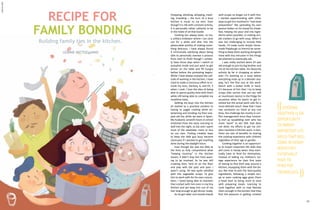
![38 39
with food. Teaching them to choose
healthful eating that takes some ef-
fort over immediately gratifying, less
nourishing options may also help
encourage them to learn to love the
bodies they have been blessed with.
Cooking is a great teaching tool
and an opportunity for family values
to be reinforced and built on. Since
the start of the year, we have been
working on a few simple “house
rules” we, as a family, plan to keep
in order to maintain a happy home
environment. Basically, these house
rules include exercising patience with
one another, speaking with kindness,
picking up after ourselves and taking
care of each others’ things. Working
on a meal together is really the per-
fect opportunity to emphasize and
train these key areas since taking
turns, being polite and respectful of
each person’s work space and learn-
ing to clean up afterwards are part
and parcel of the experience.
Spending time together working
side by side in the kitchen is an inval-
uable opportunity to pass on family
traditions particularly during special
occasions. My maternal grandmoth-
er or ‘Nana’, as I called her, cooked
using her gut instinct almost all of
the time. Trying to recreate her sig-
nature dishes without having actu-
ally witnessed her in action means it
is nearly impossible to replicate that
distinct flavor. I regret not having
spent more time observing her in the
kitchen so I’m now making a more
conscious effort to document, and
perhaps later on, teach my favour-
ite recipes my own children. In the
meantime, I want to make cooking
together an experience that leaves
a happy trail of memories and expe-
riences. Besides, it's a fact that chil-
dren are more likely to eat what they
have helped to make.
The best part of cooking together
as a family is that it gives everyone a
sense of accomplishment, especially
little ones. Being able to participate
a basic daily activity builds their con-
fidence and their willingness to offer
help can make a difference. Zachary
and Eli really like knowing that they
are being of service to me and they
feel proud of the contribution they
have made. Being able to cook to-
gether is so important to me person-
ally since I am also given the chance
to demonstrate the patience (es-
pecially when clear instructions are
ignored) and graciousness (so what
if the carrots aren’t chopped in pre-
cisely the same shape?) I want my
children to mimic.
So how can you get cracking with
the seemingly daunting task of get-
ting everyone involved in the kitchen
to work? Here are some pointers that
might make the impossible more do-
able and practical:
1. Designate a day for family cook-
ing. It could be once a week, or once
a fortnight or even once a month but
choose a day when everyone’s sched-
ules are the least harried.
2. Keep things simple. Whether
you’re a seasoned cook or a new-
bie, remember that cooking solo is
quite different from having all hands
on deck and it may sometimes take
longer. Pick easy to prepare recipes
and save those more elaborate men-
us for when you have more time.
3. Plan ahead. There is really
no need to spend hours on end in
the kitchen. Having a plan of action
makes things more convenient and
less stressful. Decide beforehand
who can do what portion of the cook-
ing to minimize confusion.
4. Remember your end goal is
more about being able to spend
quality time together rather than the
quality of the food or the punctuality
with which you start your meal.
It really doesn’t matter if you have
managed to pull off a five-course
meal or a one-pot supper. Having this
time together should really be about
realizing the gift God has given in the
form of each family member and that
as you pause to give thanks to Him
for His provisions, all will know that
these blessings come from our Father
in heaven. [+]
There are many episodes in the gospels where
Jesus communed with his followers over a meal.
Consider the feeding of the multitudes, the break-
ing of bread at Emmaus, the Last Supper, and the
picnic on the shore after the ressurection. Commu-
nity time over food is clearly important to the Lord.
Even on a human level, sociologists have found
that where husbands and wives have a strong mar-
riage, where parents have better relationships with
their children, families were more likely to have
family dinners. That is to say, the practise of family
meals is an indicator of the family health.
Eating together as a family – when members
gather, talk and share values in the process – is an
effective way of building a strong family culture.
How then, can we break bread together in an inten-
tional way?
Try to eat together regularly. Make this a priority
and schedule work and activities around family
meals. It does not have to be dinner. It could be
breakfast, lunch, or even dessert. Stories abound
where busy, high-powered executives go home for a
meal and then return to work.
Impractical, you say, when parents work late,
son has football at 6 pm and daughter has tuition at
7. Where evenings are crazy, perhaps mornings are
not so much. Even when mornings and evenings
are bad, everyone can take a break from their own
((COOKING IS A
GREAT TEACHING
TOOL AND AN
OPPORTUNITY FOR
FAMILY VALUES TO
BE REINFORCED
AND BUILT ON.
))
activities and gather for a snack as a family before
bedtime. The key is to make time to come togther as
a family regularly for bonding time.
Say grace. Giving thanks before eating emphasis-
es gratitude to God, and is a simple way of pre-
senting your family together before the Lord. Take
turns to give thanks. Even the youngest child can be
taught to give thanks with a set prayer. Alternative-
ly, grace can be sung.
Breeding good manners. Eating together is per-
fect for teaching children manners, either explicitly,
or by example. It will help them cultivate a polite
and refined mindset that will go far beyond the
meal table.
Have meaningful conversations. Don’t ask ques-
tions that can be answered with a simple 'yes' or
'no'. Ask open-ended questions about their day.
Families with older children may discuss current
events and issues.
Sharing family history, stories from your grow-
ing-up years, and teaching points from your experi-
ences will interest your children. Simply put, if you
are real and open with your kids, they will be open
and real to you.
All this can happen quite naturally and spon-
taneously over a meal – when the physical, moral,
intellectual and spiritual health of every member of
a family can be nourished. [+]
LET'S BREAK BREAD TOGETHER
ABIGAILGOH](https://image.slidesharecdn.com/lfjan2014web-140604094228-phpapp02/85/Loaves-Fishes-Jan-Mar-2014-21-320.jpg)
